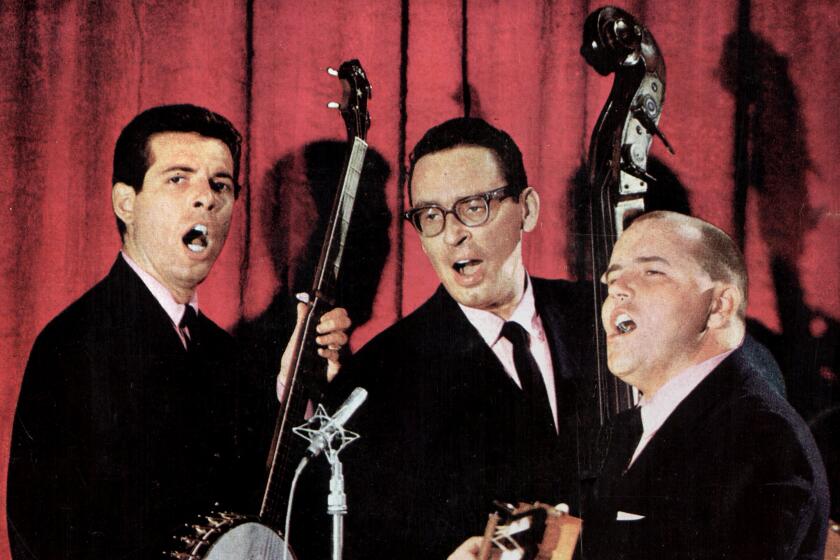KMPC-FM Finds Its Niche by Playing It Safe
It’s been nearly a decade since Steely Dan’s “FM” offered a sly, hipster-tribute to rock radio, purring “No static at all.”
If the band was describing the aura of today’s FM rock radio, they’d need a new motto: “No life at all.” Rock radio is miserably dull, bloodless and crowded with “classic-rock” oldies stations that either put listeners to sleep or give them a bad case of deja vu .
So we were momentarily excited by the news that KUTE-FM had been transformed into KMPC-FM, which is using the moniker “The All New FM-102.” Another promising sign: FM-102’s new program director is none other than Sam Bellamy, a savvy L. A. radio vet who was at the helm of KMET-FM during many of its glory years in the ‘70s and early ‘80s.
Unfortunately, this is 1987, another year of lowered radio expectations. KMET has been replaced by The Wave. KROQ has become a tired in-joke. And Bellamy acknowledged--perhaps a bit wistfully--that if you’re looking for ground-breaking radio, don’t bother punching the dial at FM-102.
“We’re not a radio station that’s going to make history,” she said with refreshing candor. “And you won’t see us breaking any new bands, either. The station certainly isn’t geared to please the critics or the record industry. We’re geared to pleasing the listener.”
OK. But not this listener. FM-102 has a lively morning show, starring likable ex-KMETers Cynthia Fox and Pat (formerly Paraquat) Kelley. But during the rest of the day, FM-102 offers more of the same dreary Lo-Cal Rock, mixing overplayed current hits (U2’s “Where the Streets Have No Name” and Sting’s “We’ll Be Together”) with tired rock standards like Stevie Wonder’s “Part-Time Lover” and Stephen Stills’ “Love the One You’re With.”
It’s one thing to hire deejays without personality. But FM-102 has music without personality too.
Has Bellamy lost her touch? Not really. FM-102, which is owned by Golden West Broadcasters, is the flagship station for a new rock format that this January will be heard on Transtar Radio Network, a nationwide satellite service. With the exception of FM-102’s morning team, the station’s jocks--and much of its overall music philosophy--come from Transtar.
Aiming for what they eventually see as a national audience, Transtar has designed a slick, homogenized pop format that--in theory--will appeal to just as many listeners in Baton Rouge as in L. A.
“We’re the flagship station for a programming format called Niche 29, which is designed to appeal to people 21 to 36 years old,” Bellamy said. “We’re going for a blend of AOR (album-oriented rock) and CHR (Top 40) radio, with an emphasis on ‘80s music. Our target listener is a guy with a regular haircut who either works in an office or outside who likes Springsteen and U2 but doesn’t want to hear rock with an irritating, heavy-metal edge.”
Niche 29. Sounds a little spooky doesn’t it? Sounds like a station relying more on research than on real-life programming smarts, doesn’t it? Bellamy admits that FM-102 does rely “heavily” on data provided by a national research firm.
And what did the firm discover? “They found that people wanted to hear more music and less talk,” Bellamy explained. “They found people could live without a lot of news and they told us that we should leave breaking new music to someone else--that our listeners want to hear more familiar bands.”
That’s why you’ll never hear the Replacements or the Cure on FM-102. Not enough “audience awareness.”
In radio, the name of the game is ratings--and if FM-102 can pull respectable ratings this fall, you’ll see the format pop up across the country, just as The Wave’s New Age format has done in recent months.
“We’re a very safe station, but we’re filling a void,” Bellamy said. “We’re going to reflect our listeners’ tastes, not dictate them.” And what about new music, the lifeblood of the record industry? Bellamy echoed the sentiments of many of today’s radio programmers.
“I hate to say it, but what makes sense for us as a radio station doesn’t necessarily have anything to do with what might serve as a boost for the record industry. We’re really going in a different direction.”
More to Read
The biggest entertainment stories
Get our big stories about Hollywood, film, television, music, arts, culture and more right in your inbox as soon as they publish.
You may occasionally receive promotional content from the Los Angeles Times.






